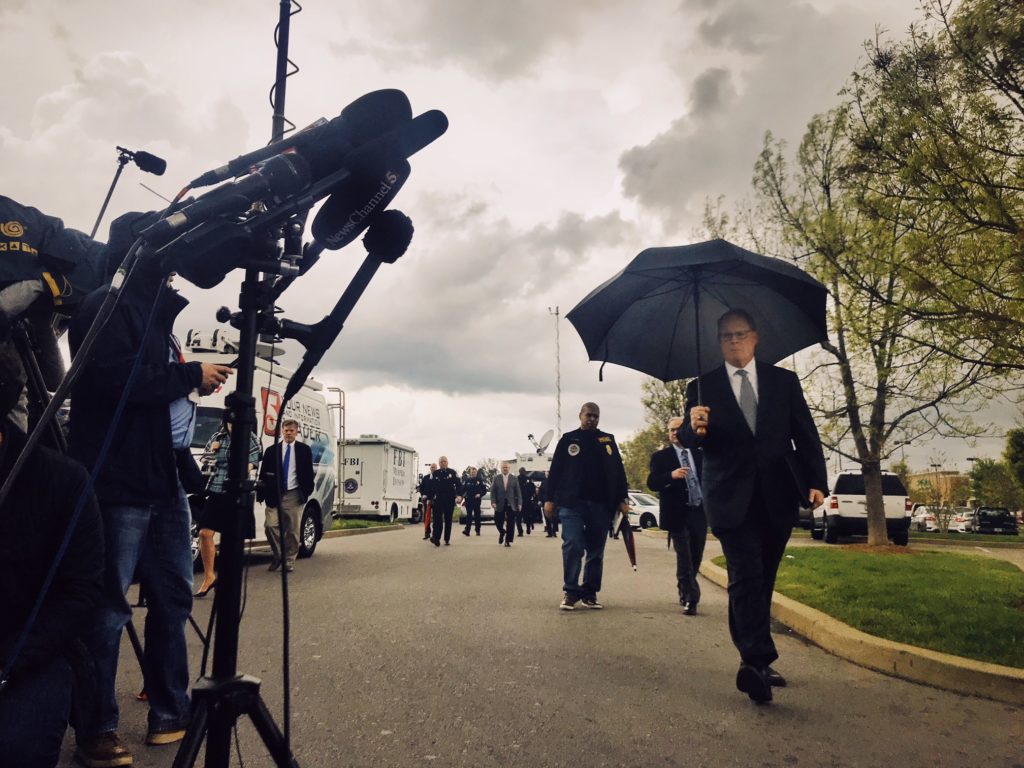
The killing of four people at a Waffle House in Antioch is exposing the frequent breakdown between the law enforcement agencies that regulate gun ownership.
A man who had his firearms license revoked in Illinois and had been arrested by the U.S. Secret Service at the White House may have broken no laws by having those guns — including an AR-15 rifle — when he moved to Tennessee late last year.
However, there is little consensus on the matter, even among law enforcement officials who are directly involved.
Nashville police chief Steve Anderson — himself a lawyer — admitted Sunday that while it was illegal for 29-year-old shooting suspect Travis Reinking to possess firearms in Illinois, “I don’t know that he would have violated any Tennessee law,” by possessing the weapons.
The next day, though, Marcus Watson, a Nashville agent with the Bureau of Alcohol Tobacco and Firearms, said unequivocally that in Tennessee, Reinking “should not have had weapons.”
At the same press conference, Matt Espenshade, a Nashville-based assistant special agent in charge with the FBI, said after the White House incident “every Federal resource was brought to bear.” He added that the agency was “able to effectively neutralize what we felt was the threat at the time by ensuring that he did not have the ability to purchase or own weapons and that those weapons were taken.”
The FBI encouraged Illinois to revoke Reinking’s firearms license and guns after being caught inside a restricted area in July 2017 at the White House. He apparently wanted a meeting with President Trump and refused to leave.
Tazwell County Sheriff Robert Huston told the Associated Press that after Reinking’s firearms were revoked, deputies returned the guns to Reinking’s father on the promise that he would “keep the weapons secure and out of the possession of Travis,” an act that was in accordance with Illinois law if Reinking’s father had a firearms license of his own.
But the suspect’s father returned the guns to his son, according to Nashville police, and that elicited a round of questions about whether the elder man would also be under investigation. Federal authorities said he could face penalties.
Run-Ins With Police
The Washington, D.C., arrest was not the first time, according to reports, that Reinking came in contact with law enforcement.
In May 2016, Reinking told deputies from Tazewell County, Ill., that singer Taylor Swift was stalking him and hacking his phone. The Associated Press reported that in August Reinking told police he wanted to file a report about 20 to 30 people tapping into his computer and phone and people “barking like dogs” outside his residence.
Susan Niland, a spokeswoman with the Tennessee Bureau of Investigation, said despite the fact that Reinking was forbidden from having guns in Illinois, it didn’t mean he couldn’t have them in Tennessee.
“It does not appear that there is anything in his record that would have been deniable from our end,” Niland said.
TBI is the agency that approves background checks for firearm purchases.
Niland added that the agency has various records and indexes that are checked when someone is attempting to purchase a firearm. One item, she said, is whether that individual has been disqualified by another state. However, there was nothing in their system that flagged Reinking as one of those people, she said.
The gun Reinking used in the shooting was purchased in Illinois, police said. But he could have just as easily bought it in Tennessee if he’d wanted to.
Democrats Want Changes
At the state capitol on Monday, Tennessee Democrats pushed to close what they see as a loophole in the state’s gun laws.
They want to make it a misdemeanor under Tennessee law for people to possess firearms after they’ve been ordered elsewhere to give them up. However, the measure is unlikely pass in a Republican-dominated legislature.
John Harris, an attorney and the executive director of the Tennessee Firearms Association, doesn’t put much stock in gun laws preventing shootings like the quadruple homicide at the Waffle House.
“Would he have been just as likely to kill someone in Illinois?” Harris asked. “I’d say yeah, just as probable. Because I think if he really wanted them he could have gotten the guns.”


